GSX's environmental responsibility webpage
GSK Sustainable Sourcing Standards (PDF - 880KB)
Understanding Impact And Dependencies On Nature (PDF - 4.8MB)
GSK Sustainability And Global Health Update At COP27 (PDF - 100.6KB)
Sharing our journey to net zero and nature positive for a healthier future (PDF - 924.3KB)
GSK Position On Environmental Sustainability (PDF - 350KB)
GSK Environmental Action Report 2022 (PDF - 1.8MB)
Environmental sustainability goals infographic (PDF - 90.6KB)
CEF Lead Executives
-
CLAIRE LUNDItem Link
Vice President Sustainability
Claire led the design of GSK’s net zero and net nature positive ambition by 2030 and is now leading delivery of these goals. This includes action on carbon, water, materials and biodiversity across the full value chain. Claire joined GSK in 2013 holding different roles in Procurement before becoming Head of Environmental Sustainability in 2017. In this role Claire accelerated delivery of GSK’s previous environmental targets and introduced the single use plastic reduction programme globally across GSK. Before joining GSK Claire worked in the public sector in the Cabinet Office as the lead for energy procurement transformation as well as with various consultancies supporting SME’s and global blue-chip organisations. She holds a MSc in Energy and Environmental Technology & Economics from the City University and a BSc in Geography from Exeter University.
-
RENATA SCOFIELDItem Link
Global Senior Director, Environmental Stewardship
Renata is GlaxoSmithKline’s Global Senior Director, Environmental Stewardship. She leads GSK’s global sustainability ambition, for both climate and nature, across value chains. She brings internal and external teams together to fully integrate environmental sustainability at every step of GSK’s products life cycles, from design to sourcing to end of life. Renata previously held various positions in strategy, sustainability, procurement, finance, and operations across Food & Drink, Investment Banking, Big Tech, E-commerce, and Oil & Gas. She is also currently appointed as a Board Member for the Alliance for Water Stewardship and a Board Trustee at Keep Scotland Beautiful. She holds a Post Graduate Certificate in Sustainable Value Chains from the University of Cambridge and a Msc in Finance and Investment from the University of Edinburgh. Renata also holds an MBA from the Federal University of Rio de Janeiro and a Bsc in Business Administration dual degree (San Diego State University and PUC-Rio de Janeiro).
-
MAUREEN KOCISKOItem Link
Program Director- Transformation Office, GSK Global Environmental Sustainability
Experienced Environmental Sustainability Executive with a demonstrated history of working in the pharmaceuticals industry. Strong professional expertise in Global Program Leadership and Delivery, data strategy, data integrity, Good Manufacturing Practice (GMP), biotechnology, and regulatory requirements.
-
RICHARD HENDERSONItem Link
Director Sustainability - Reporting and Assurance
Experienced sustainability professional in a global multinational pharmaceutical company, recently led the development of the carbon strand of GlaxoSmithKline’s (GSK) new Net Zero Climate, Nature Positive by 2030 strategy. I lead the environmental sustainability reporting and data assurance for GSK including developing our approach to Task-Force on Climate Related Financial Disclosures (TCFD); I manage the environmental data collection from a network of 100+sites. I am the company expert on Carbon Footprinting and lead certification of product carbon footprints and LCA, and the annual Value Chain Carbon Footprinting (Scope 1,2 & 3) for GSK.
Specialties: Sustainability, Carbon Footprinting, Environmental reporting, Green Chemistry in the Pharmaceuticals Industry, life cycle, green metrics, developing new knowledge through data analysis and organisation, catalysis, continuous processing, sustainable technologies and materials (renewable resources), Process Development, Environment Health and Safety -
ADELE CHELIItem Link
Sustainability Partnerships & Strategy Director
My focus is designing and implementing strategies that allow businesses to look after profit, people and the planet. It is a complex challenge that requires innovation, curiosity and breaking down barriers between disciplines and I am very happy to work with and learn from so many leaders and businesses out there that are getting it done. Interested in everything carbon offsetting, nature based solutions, nature protection/restoration and the connection between health, nature and climate.
-
CHRIS HAYESItem Link
Sustainability Operations Director
A strategic sustainability leader, and subject matter expert, with the ability to collaborate and drive change at a business and industry level. I define, inspire, and deliver more sustainable outcomes, engaging stakeholders to think big and deliver results. A passionate environmentalist, and creative problem solver with imagination, initiative and excellent communication and people development skills.
-
GIULIA USAIItem Link
Senior Director Procurement Sustainability CoE
-
LLARIA LO PRESTIItem Link
Head of sustainability Engineering, COE Senior Director
-
HANNAH GREENItem Link
Communications and Government Affairs Director, Sustainability
Director with over 15 years' experience designing and leading implementation of sustainability and ESG communications and partnerships in the healthcare, tech and consumer industries. Expertise in climate change, nature loss and public health. Skilled at influencing senior leaders, reporting and disclosure, partnerships, communications campaigns including social media, media, leader comms, events, investor relations and employee engagement. Lived and worked in France, Italy, South Africa and India. Oxford University Graduate with a Master Research Degree in Corporate Governance and Ethics from the University of London.
Sustainability Goals
Current Sustainability Goals
Our pathway to net zero impact on climate (March 2023)
Impact on Climate
2025 Goals
- Achieve 100% renewable electricity (scope 2)
2030 Goals
- Achieve 80% reduction in carbon emissions and invest in nature-based solutions for the remaining 20% of our footprint (all scopes)
2045 Goals
- Achieve net-zero emissions across our full value chain (all scopes, 2020 baseline) relying on high-quality carbon credits for a maximum of 10% residual emissions.
— We have re-submitted our new carbon targets and pathway to the Science Based Targets Initiative to verify that they align to a 1.5° pathway, following the demerger of our Consumer Healthcare business
— We have submitted our 2045 target to the Science based Targets Initiative for verification by their Net Zero Standard
— We disclose progress against these targets annually in our Annual Report and ESG Performance
Impact on Nature 2030 goals
Water
- 100% of our sites to achieve good water stewardship by 2025 and reduce overall water use by 20% by 2030
- Water neutral in operations and with key suppliers in water-stressed regions
- Zero impact active pharmaceutical ingredient levels (below the predicted no-effect level) for all sites and key suppliers
Waste and materials
- Zero operational waste (including a 20% reduction in routine hazardous and non-hazardous waste), including eliminating single use plastics (where regulatory obligations allow, and excluding plastics which are critical to product discovery and development and health & safety)
- 25% environmental impact reduction for our products and packaging
- 10% waste reduction from supply chain
Biodiversity
- Positive impact on biodiversity at all GSK-owned sites
- 100% of agricultural, forestry and marine derived materials sustainably sourced
and deforestation free
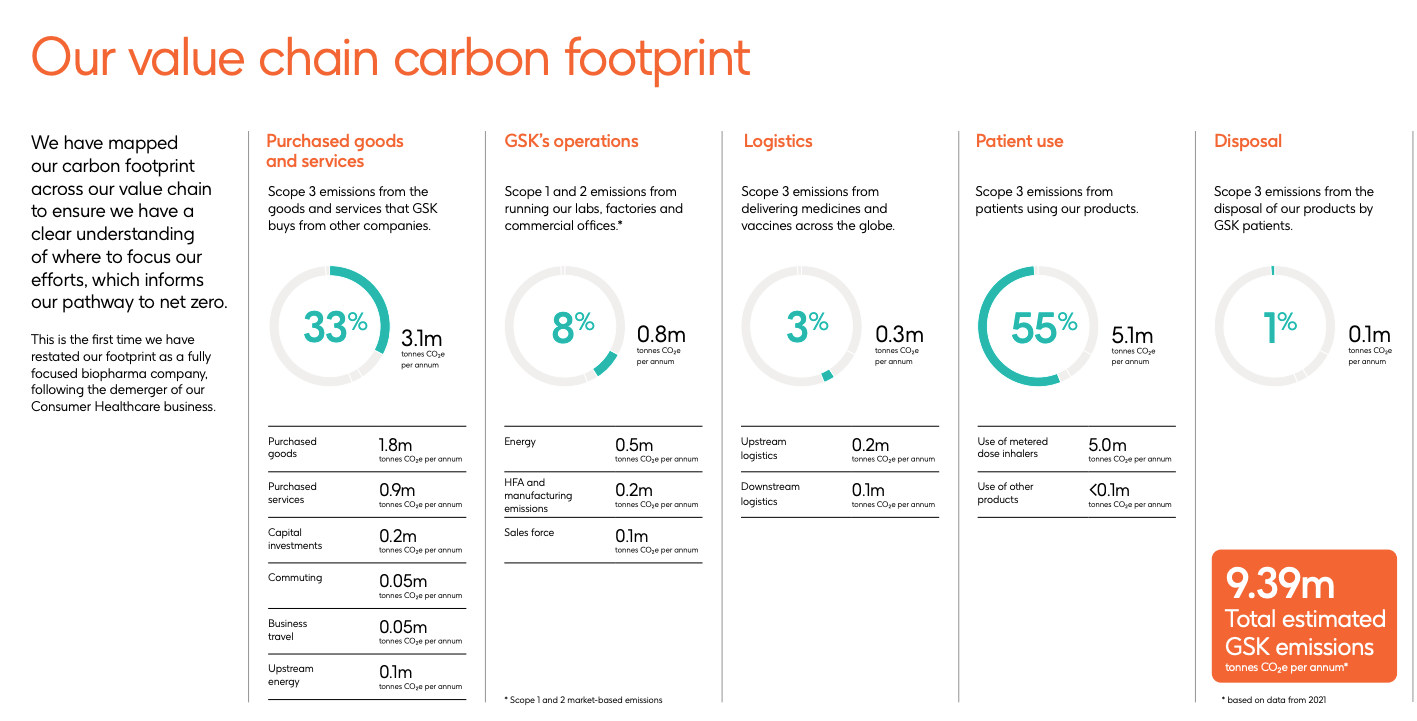
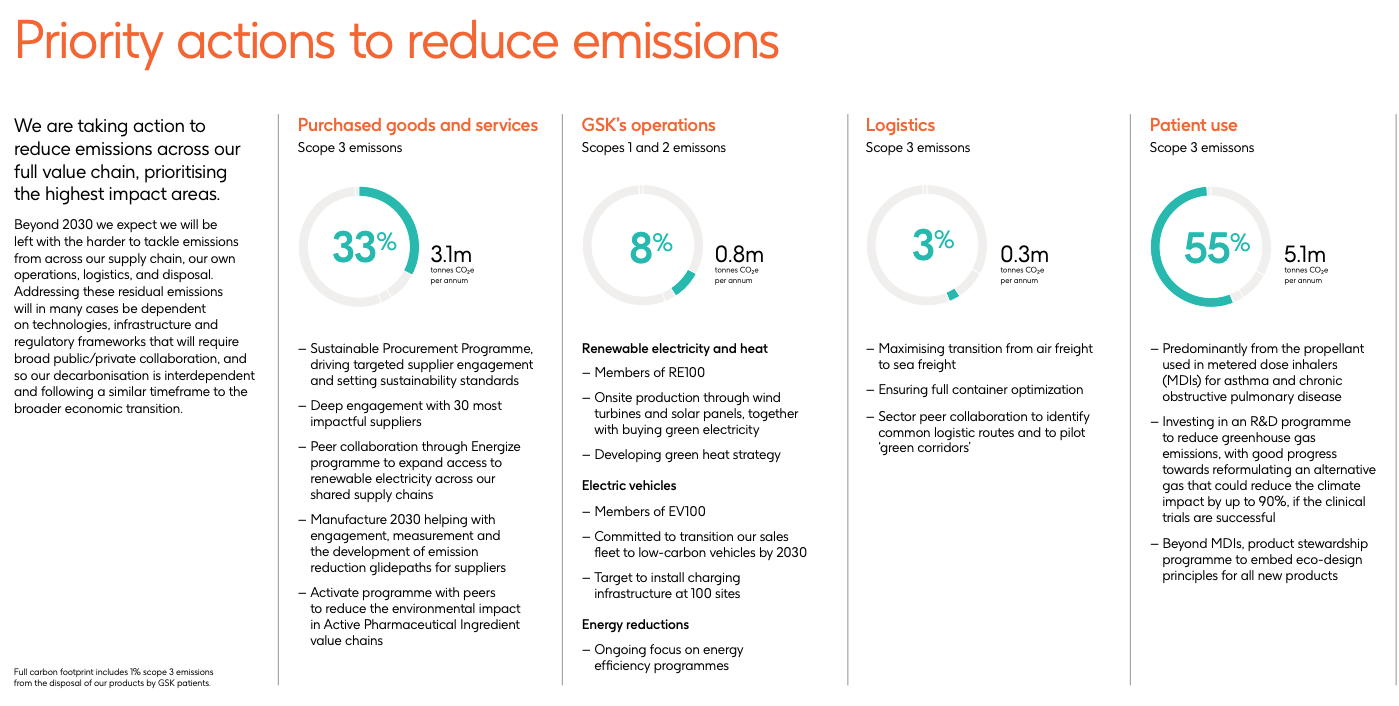
Latest Sustainability Reporting
Highlights
- Reached 89 million people in lower income countries with its vaccines and antiretrovirals in 2023.
- Reduced Scope 1 and 2 operational emissions by 10% from 2022.
- GSK’s low-carbon rescue metered dose inhaler (MDI) medication, which would reduce GHG emissions from its use by 90%, became ready for phase III trials. (Use of MDIs make up 48% of company’s total emissions.)
- Decreased overall water use by 24% and by 11% for sites in high water-stress regions (2020 baseline).
- 89% of direct high-risk suppliers achieved the company’s minimum EcoVadis score or have an improvement plan in place.
- 23% of its top 30 suppliers by carbon emissions have submitted science based targets for validation, with eight of those approved.
- Women held 45% of VP-and-above roles globally in 2023, up from 42% in 2022.
- Ethnically diverse leaders held 35.7% of VP-and-above in the U.S. in 2023, up from 31.3% in 2022.
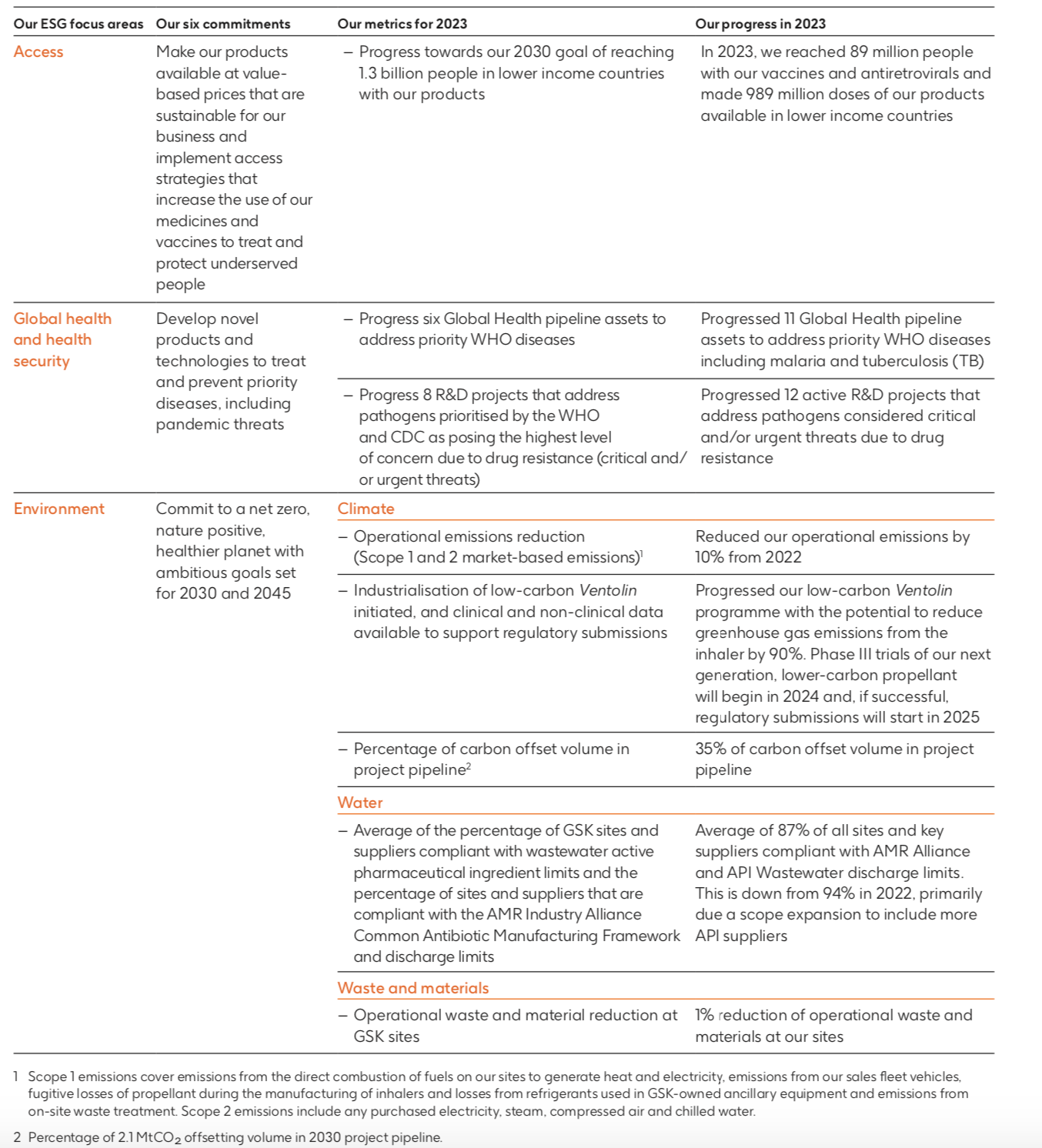
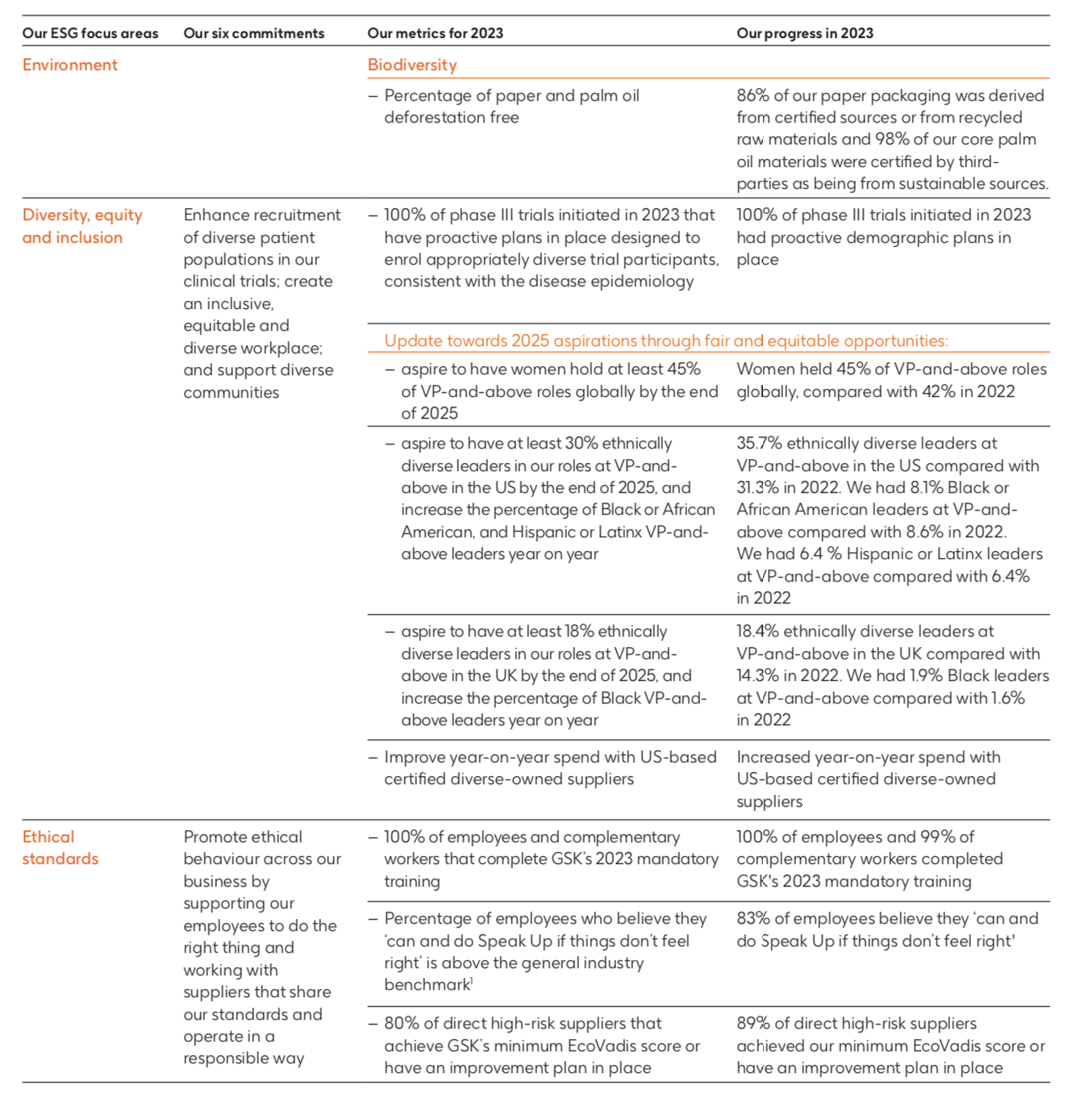
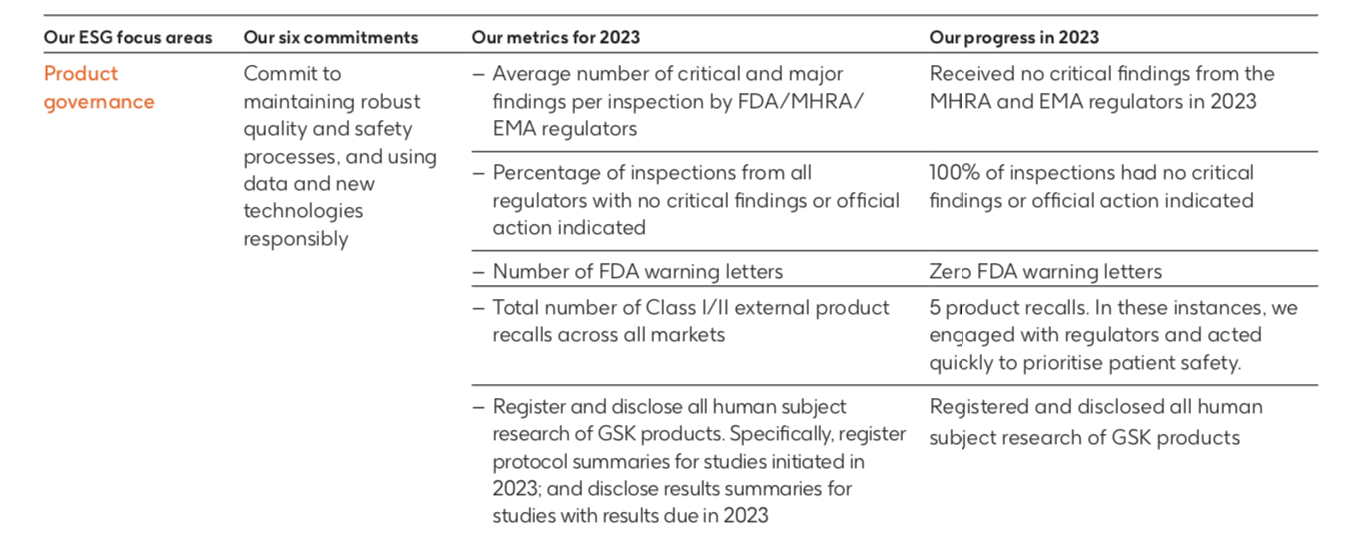
Recent News
2024
GSK / IGNIS —GSK, in partnership with Schneider Electric, announced a Virtual Power Purchase Agreement (VPPA) with renewable energy group IGNIS. This VPPA will facilitate the supply of 200 GWh of renewable electricity certificates per year. This VPPA will account for approximately 50% of GSK’s total electricity demand in Europe for 12 years, starting in mid-2026. Schneider Electric advised during the project evaluation and PPA negotiation phases. (March 2024)
2023
Will start Phase III trials of a low emissions version of its metered dose inhaler, using a next generation propellant, in 2024. This could reduce GHG emissions from inhaler use by approximately 90%. (The current propellant accounts for 49% of GSK’s carbon footprint.) (Dec 2023)
Joined the CEF member network August 2023!
2022
GSK launched a Sustainable Procurement program that will require and support suppliers to take action on carbon, power, heat, transport, water, waste, and sustainable deforestation-free sourcing of materials. Specific areas of action include disclosing emissions; setting carbon reduction targets; switching to renewable energy; achieving water neutrality in water stressed areas; waste reductions of 10%; aligning to the company’s responsible sourcing minimum standards; and, for transport suppliers, providing green transport solutions. (Sept 2022)
The Carbon Call — Twenty corporate, scientific, philanthropic, and intergovernmental organizations, hosted by the ClimateWorks Foundation, launched a new collaboration to accelerate the development of reliable and interoperable carbon accounting, with a focus on carbon removal and methane, indirect, and land-sector emissions. Participating organizations will work to advance universal accounting methodology standards, expand access to reliable GHG emissions and removal data, and strengthen the interoperability of digital accounting infrastructure. Corporate signatories (including CEF member Microsoft plus Capricorn Investment Group, EY, GSK, KPMG, and Wipro) commit to annually and transparently reporting on their GHG emissions and offsets, including all scopes and classes. (Feb 2022)
2021
Lowering Emissions by Accelerating Forest finance (LEAF) Coalition — A public-private initiative to mobilize more than $1 billion to protect tropical forests from deforestation, protect the rights of local Indigenous Peoples, and support sustainable development in emerging economies. Coordinated by nonprofit Emergent, it involves the U.S., the U.K, Norway, and corporate partners Amazon, Airbnb, Bayer, Boston Consulting Group, GSK, McKinsey, Nestlé Salesforce, and Unilever. (April 2021)
How can we help? Please reach out to us!
Laura Keenan, Chair
laura@corporateecoforum.com | (617) 921-2307
Amy O’Meara, Executive Director
amy@corporateecoforum.com | (857) 222-8270
Mike Rama, Deputy Director
mike@corporateecoforum.com | (607) 287-9236
Margaret Fenwick, Program Lead
margaret@corporateecoforum.com I (917) 678-4161
MR Rangaswami, Founder

